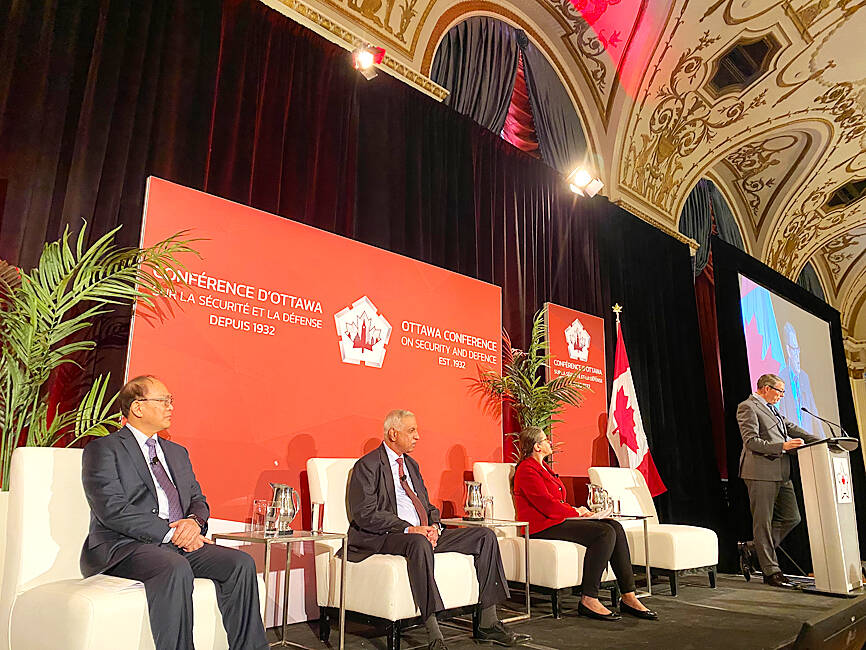The Special Committee on Canada-China Relations in the Canadian House of Commons on Thursday published its first report on Taiwan, which analysts in Taiwan have called a “breakthrough” in bilateral relations.
The report, titled Canada and Taiwan: A Strong Relationship in Turbulent Times, suggests that the two nations should launch diplomatic visits, and calls on the Canadian government to voice the position that Taiwan’s future can only be determined by Taiwanese.
The report also discusses Canada’s engagement with Taiwan, its trade with and investment in Taiwan, the state of regional peace and security in the Indo-Pacific region, and other issues related to Taiwan’s relationships with Canada and China.

Photo courtesy of the Taipei Economic and Cultural Office in Canada via CNA
The report is based on the testimonies at congressional hearings by Representative to Canada Harry Tseng (曾厚仁), Canadian government officials, academics, experts and others.
The report states that the People’s Republic of China (PRC) “has a ‘one China principle’ that is markedly different from Canada’s ‘one China policy.’”
The report cites one Canadian official who characterized Canada’s policy as a “very flexible approach” that was designed to be “strategically ambiguous.”
Conversely, China’s principle “holds that Taiwan is part of the PRC and should be reunited with mainland China,” and China considers visits to Taiwan by foreign government officials as being “inconsistent in bestowing an act of sovereignty to the state that China believes should be a province.”
The committee’s report also cites University of Ottawa professor and Macdonald-Laurier Institute senior fellow Scott Simon as saying that “Canada does not endorse the PRC’s claims over Taiwan.”
The report’s conclusion quotes Tseng as saying that “if Taiwan falls, democracy falls, and that will be the ultimate concern of all of us.”
Speaking to the Central News Agency, Tseng said that the report was the most significant development in Taiwan-Canada relations since the two nations severed diplomatic ties in 1970.
“The Canadian parliament has never published such a comprehensive report on Taiwan,” he said. “The report expresses support for Taiwan’s participation in international affairs, and also emphasizes the importance of economic, trade and diplomatic cooperation between the two countries.”
The report expresses support for Taiwan’s meaningful participation in the UN Permanent Forum on Indigenous Issues, which “would benefit indigenous peoples in Taiwan,” whereas Taiwan’s exclusion “contradicts” the forum’s purpose.
It also calls for Taiwan’s inclusion in the International Civil Aviation Organization and the WHO, and says that the Canadian government should evaluate Taiwan’s application to join the Comprehensive and Progressive Agreement for Trans-Pacific Partnership.
It also calls for progress on the Canada-Taiwan Foreign Investment Promotion and Protection Arrangement, and says that the Canadian minister of international trade should visit Taiwan to sign the agreement.
No Canadian minister has visited Taiwan since former Canadian minister of industry John Manley in 1998.
The report also calls on China to exercise restraint in the Taiwan Strait and cites Simon as saying that “Canada would continue to oppose economic coercion, as well as more overt military coercion and threats.”

PREPAREDNESS: Given the difficulty of importing ammunition during wartime, the Ministry of National Defense said it would prioritize ‘coproduction’ partnerships A newly formed unit of the Marine Corps tasked with land-based security operations has recently replaced its aging, domestically produced rifles with more advanced, US-made M4A1 rifles, a source said yesterday. The unnamed source familiar with the matter said the First Security Battalion of the Marine Corps’ Air Defense and Base Guard Group has replaced its older T65K2 rifles, which have been in service since the late 1980s, with the newly received M4A1s. The source did not say exactly when the upgrade took place or how many M4A1s were issued to the battalion. The confirmation came after Chinese-language media reported

A Ministry of Foreign Affairs official yesterday said that a delegation that visited China for an APEC meeting did not receive any kind of treatment that downgraded Taiwan’s sovereignty. Department of International Organizations Director-General Jonathan Sun (孫儉元) said that he and a group of ministry officials visited Shenzhen, China, to attend the APEC Informal Senior Officials’ Meeting last month. The trip went “smoothly and safely” for all Taiwanese delegates, as the Chinese side arranged the trip in accordance with long-standing practices, Sun said at the ministry’s weekly briefing. The Taiwanese group did not encounter any political suppression, he said. Sun made the remarks when

The Taiwanese passport ranked 33rd in a global listing of passports by convenience this month, rising three places from last month’s ranking, but matching its position in January last year. The Henley Passport Index, an international ranking of passports by the number of designations its holder can travel to without a visa, showed that the Taiwan passport enables holders to travel to 139 countries and territories without a visa. Singapore’s passport was ranked the most powerful with visa-free access to 192 destinations out of 227, according to the index published on Tuesday by UK-based migration investment consultancy firm Henley and Partners. Japan’s and

BROAD AGREEMENT: The two are nearing a trade deal to reduce Taiwan’s tariff to 15% and a commitment for TSMC to build five more fabs, a ‘New York Times’ report said Taiwan and the US have reached a broad consensus on a trade deal, the Executive Yuan’s Office of Trade Negotiations said yesterday, after a report said that Washington is set to reduce Taiwan’s tariff rate to 15 percent. The New York Times on Monday reported that the two nations are nearing a trade deal to reduce Taiwan’s tariff rate to 15 percent and commit Taiwan Semiconductor Manufacturing Co (TSMC, 台積電) to building at least five more facilities in the US. “The agreement, which has been under negotiation for months, is being legally scrubbed and could be announced this month,” the paper said,